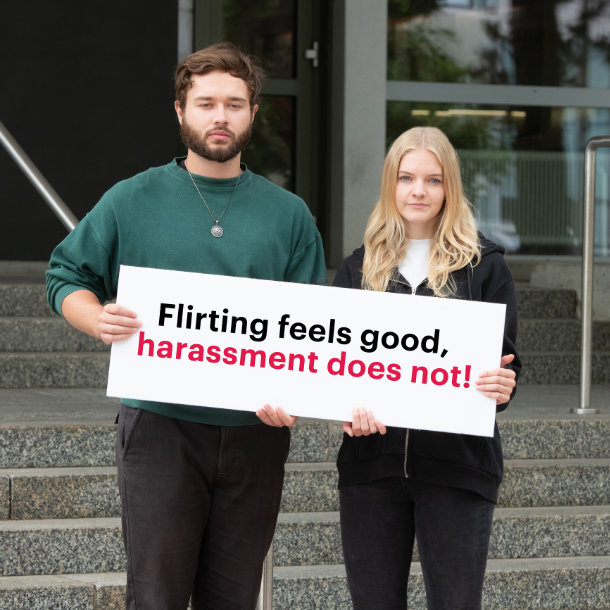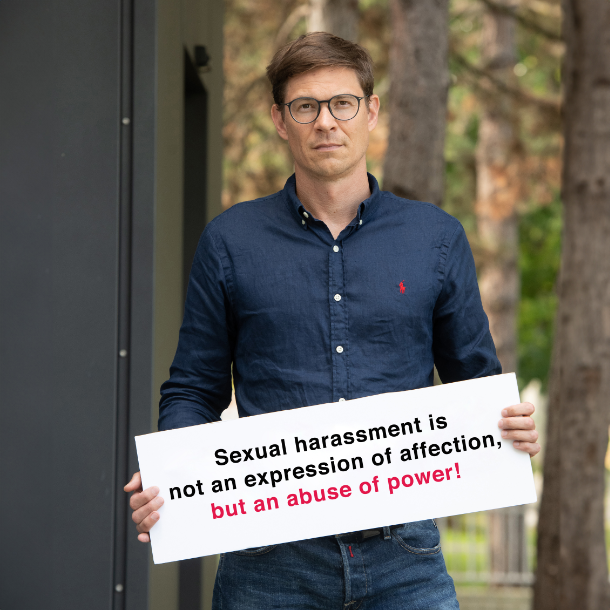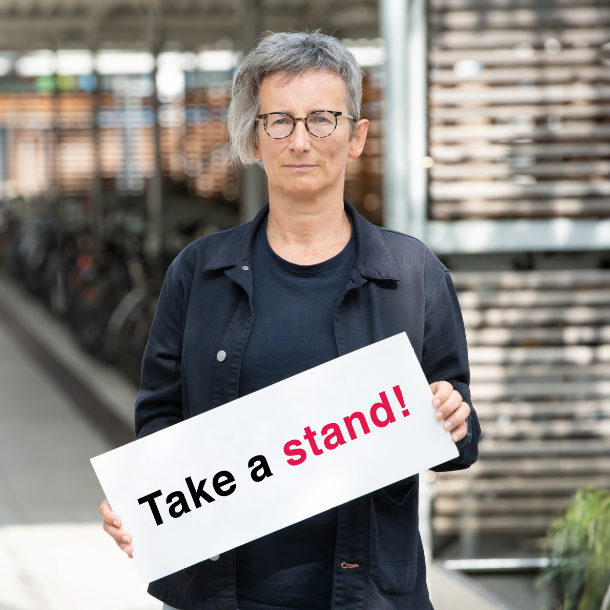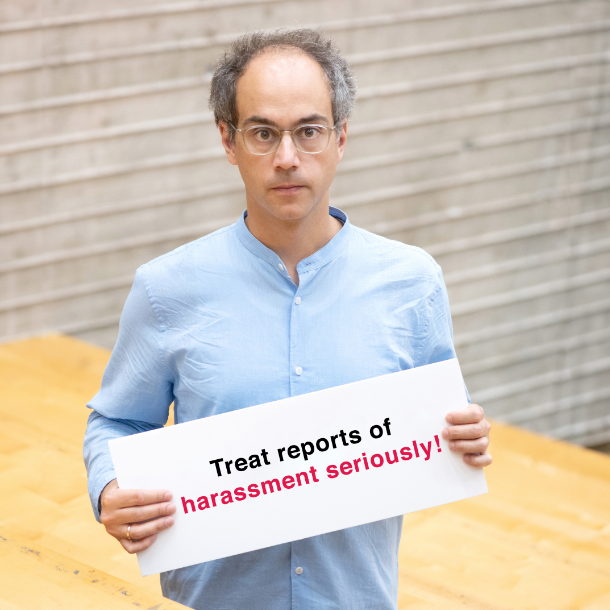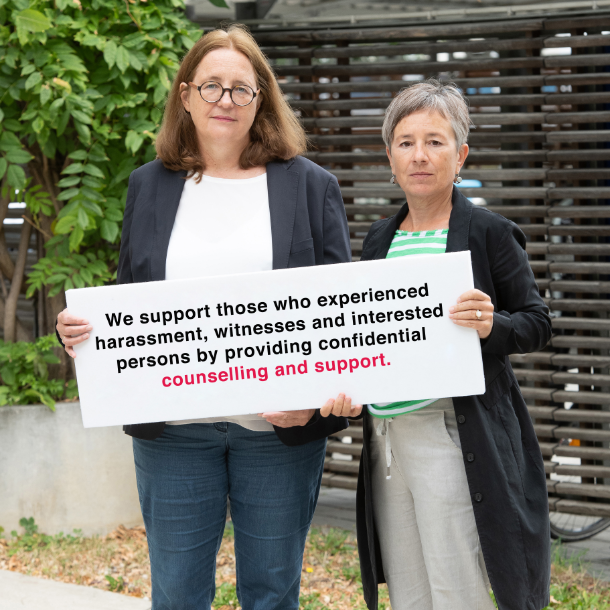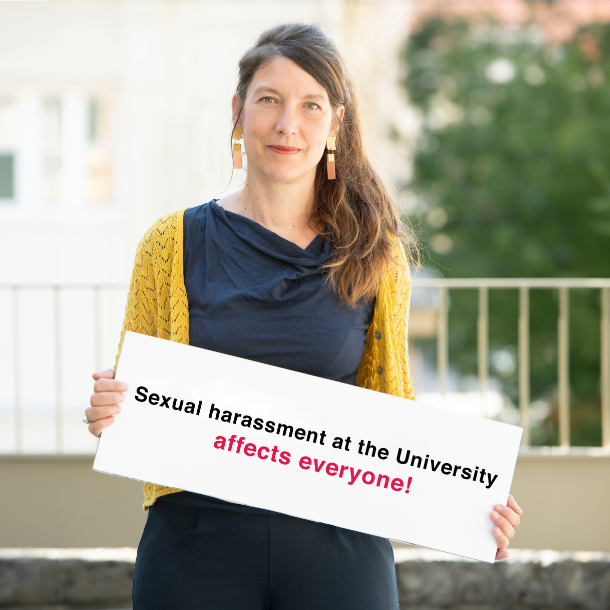
I would like to encourage you all to take a stand and to address the sensitive issue of sexual harassment clearly and openly, so we can create an environment at TU Graz where all people enjoy working and studying.
What is sexual harassment?
Sexual harassment is a form of discrimination that is often practiced by people who are in a powerful or secure position and can count on finding support in their environment. Despite the growing awareness of this problem, sexual harassment is often still considered a ‘taboo’ subject at universities.
BREAK THE TABOO. People who observe or experience sexual harassment may not come forward or take further action because the lack information and/or feel uncertain about what to do. It is important, however, to respond to sexual assault and sexual violence so that all students and staff can learn and work in a safe environment.
TAKE ACTION. It is important to take action when assaults and discrimination occur! Everyone at the university has the responsibility to support prevent measures and to raise awareness.
EXPRESS COMPASSION. Someone who is affected by sexual harassment or violence can feel paralysed and unsure what to do, so it is important to express your compassion and support!
According to the Federal Equal Treatment Act (Bundes-Gleichbehandlungsgesetz, B-GlBG), sexual harassment is defined as conduct belonging to the sexual sphere which impairs the dignity of a person and is unwanted, inappropriate, degrading, offensive, or objectionable to the person concerned, thereby creating an intimidating and hostile working environment for that person (see § 8 B-GlBG).
The law protects people of all genders, but currently women are affected in most cases.
Sexual harassment is a form of gender-based violence. This behaviour is not an expression of affection, but an abuse of power. University structures that are characterised by different power and dependency relations can promote gender-based violence.
Because many people assume that sexual harassment does not occur in an academic environment, those affected may feel as though they have to play down or not talk about their experiences.
Examples of sexual harassment
Examples of sexual harassment are varied, ranging from lewd jokes and "accidental" touching to promised rewards for sexual compliance or threats of negative consequences if overtures are rejected.
How is sexual harassment defined?
The affected person defines what is perceived as harassing behaviour. It is irrelevant whether the harassing person intended this behaviour as such or not.
Who and where?
Harassment can be come from superiors, colleagues, students, but also people from outside the university. It can potentially happen anywhere.
It is important to get more information!
If you are unsure whether you have experienced or witnessed sexual harassment has occurred, it is important to seek more information and exchange information with others.
- Sexist remarks and jokes, telling sexist anecdotes
- Insinuating, ambiguous, and derogatory remarks and hurtful statements about a person's appearance, sex life, or sexual orientation
- Inappropriate, (sexually) harassing communication style
- Invitations to engage in sexual acts, threats of professional harm if the person rejects sexual requests, or promises of professional benefits if the person complies with sexual requests
- Unwanted invitations with clearly stated intentions, electronic messages with sexual innuendos
- Repeated staring, appraising (i.e. "undressing") looks
- Degrading, provocative gestures
- Showing or posting sexist/pornographic material (screensavers)
- Exposure of intimate body parts or obscene gestures
- Unwanted physical contact (patting, stroking, pinching, hugging, kissing)
- Repeated physical advances
- Physical violence and any form of sexual assault up to and including rape
Legal basis
Sexual harassment has been recognised as a separate criminal offence in Austria since 2004.
Sexual harassment is regulated by the Austrian Federal Equal Treatment Act (in German: Bundes-Gleichbehandlungsgesetz) and applies to all persons who are in an employment or training relationship with the university or who apply for admission to an employment or training relationship, as well as to students.
Legal consequences of sexual harassment
According to § 19 para. 1 B-GlBG, the person affected by harassment can file a legal claim against the harassing person for compensation for the damages suffered as a consequence of the harassment.
If the university representative is proven to have failed to take appropriate remedial action in the event of harassment by a third party, the claim for compensation for the damages suffered can also be made against the university.
Insofar as the disadvantage does not consist of a loss of assets (e.g. treatment costs, loss of earnings), the affected person is entitled to appropriate compensation for the personal damages suffered, and minimally damages of €1000.
Sexual harassment also has consequences under service and disciplinary law, ranging from a reprimand to dismissal. According to the B-GlBG, sexual harassment is considered discrimination on the grounds of gender in connection with an employment or training relationship (§ 8 B-GlBG). Burden of proof: The sexual harassment must be made credible. It is up to the alleged harasser to prove that no sexual harassment took place.
- Universities act (in German: Universitätsgesetz)
- B-GlBG: Prohibition of discrimination, requirement to promote women
- TU Graz Affirmative Action Plan and Action Plan for the Advancement of Women
- Employment and disciplinary regulations: Sexual harassment is considered an act of discrimination and constitutes a violation of employment law.
- Criminal Code (criminal offences) (in German: Strafgesetzbuch): Coercion, rape, physical assault, abuse of authority
What should an affected person do?
The feelings you have after experiencing sexual harassment can be inhibiting, unsettling, and perplexing. Do not let this stop you from reporting the harassment! Simply give yourself enough time to process your thoughts and feelings, and take your own feelings seriously.
Counselling and support.
You can find help both inside and outside of the university, including from fellow students, teachers, advisors, and the Working Group for Equal Opportunities at TU Graz. Professional support can provide even more help in facing psychologically stressful situations. Contact points.
Break the silence!
Clearly describe what behaviour crossed your boundaries and what you perceive as harassment.
Set boundaries!
Clearly show your disapproval and set clear boundaries. A confident NO can help to make harassment stop.
Document in writing.
Record any incidents of harassment in writing (e.g. with logs) and keep any related emails. If possible, get witnesses to sign these documents or logs and make sure that the harasser receives clarification in writing.
Further action. Learn more about the legal situation and your options. Seek more advice. Legal bases
The TU Graz Working Group for Equal Opportunities provides advice and helps people who have experienced harassment / discrimination based on their gender, ethnicity, religion, ideology, age, or sexual orientation or witnessed such discrimination.
It is legally obliged to treat all concerns confidentially: no step is taken without the consent of the person concerned!
What should a witness do?
If you witness sexual harassment, offer support to the affected person! Do not ignore the behaviour!
In an acute situation: Demand that the behaviour stops
- Confront the person who is sexually harassing another person and do not accept or pretend to accept their behaviour for reasons of "politeness".
- Clearly say why you as a witness find the behaviour harassing.
- Do not join in when others laugh at lewd jokes or sexual harassing behaviour.
Sexual harassment can also be stressful for witnesses. If you were not able to intervene immediately, it does not mean that it is too late. There are still many ways to offer the affected person your support after the incident has occurred.
Ways to intervene
- Offer your support. Offer support to the person concerned!
- Talk about what happened together. Talk with the affected person to clearly find out what kind of support they want. Give the person space and time to describe the situation and process their thoughts and feelings. Consider what next steps can be taken together.
- Respect confidentiality. Treat the information entrusted to you as confidential. Avoid "gossiping" about harassment that you have learned about.
- Respect the affected person’s wishes. Listen to what the affected person, offer to support them as they take the next steps, and give them time and space to do so.
- Learn more about the topic of sexual harassment and gender-based violence so that you can share this information with others.
- Raise the issue of sexual discrimination and sexual violence at your workplace or place of study in order to break the taboo.
- Do not be afraid to serve as a witness if an affected person approaches you and asks for your help.
What should a manager do?
As a manager/supervisor at the university, you are obliged to take appropriate measures to protect a person who is being harassed from further harassment. Sexual harassment, general harassment, and bullying are subject to sanctions under service or disciplinary law.
Treat reports of harassment seriously!
Take a stand if you experience or observe sexual harassment or discrimination in your environment.
Be proactive and react appropriately.
Discuss strategies for action with the affected person and determine what kind of support is desired or needed. Create a safe space for discussions to take place and treat what is said respectfully and seriously.
Create an appreciative, respectful working and study environment.
Act as a role model to create an environment that is free of discrimination and harassment.
According to § 18 AngG, university management and superiors are subject to the duty of care. They are obliged to care for the physical and mental health of their staff. If incidents of harassment fall within your area of responsibility, you have an official duty to act appropriately.
At TU Graz, guidelines for cooperation, honesty, fairness, appreciation, and respect should be followed by all staff members. It is important to consider the existing relationships of dependency and power structures. All members of TU Graz, and especially those with management duties, are responsible for ensuring that (sexually) harassing behaviour and bullying are not tolerated in their area of work.
The Affirmative Action Plan, Action Plan for the Advancement of Women, and the Universities.
Advice and support: Internal and external contact points
TU Graz supports victims, witnesses, and involved parties by providing confidential counselling services, information, and intervention options.
Have you experienced or observed gender-based discrimination or assaults? You can contact the Working Group for Equal Opportunities at any time and make a request for a confidential discussion.
Information, counselling services, and intervention options regarding any form of harassment, including sexual harassment, mobbing, and discrimination on the basis of gender, ethnicity, religious or other beliefs, age, or sexual orientation.
All TU Graz students and staff can contact the AkG with questions about (sexual) harassment or discrimination.
All conversations are treated as confidential and can be conducted anonymously. Steps or measures are only taken after explicit consultation with and the consent of the affected person. The discussions take place in a safe environment.
Contact us:
- Voluntary
- Confidential
- (Professionally) independent
- Professional
- Anonymous (upon request)
After contacting the AkG (in person, by phone, in writing, or by email), the first meeting (confidential and anonymous if necessary) offers the affected person a safe space to describe what has happened, to sort out their thoughts, and to consider possible courses of action together.
Do not hesitate to contact the AkG with your concerns!
- Student Union (HTU), Department for Women's Policy and Equality (for students): Student Union (HTU) | frauen@htugraz.at
- Student Union (HTU Graz), Department for LGBTQIA+ students (for students): Student Union (HTU Graz) | queer@htugraz.at
- TU Graz Works Council: betriebsrat.allgemein@tugraz.at | brwiss@tugraz.at
- Accessibility at TU Graz
- Psychosocial counselling for students
- TU Graz Student Ombudsperson
- Women's helpline against male violence (anonymous, confidential, free of charge): 0800 222 555
- Männerinfo – hotline providing crisis counselling for men (anonymous, confidential, free of charge): 088 400 777
- Ombud for Equal Treatment. Styrian Regional Office: gleichbehandlungsanwaltschaft.gv.at, graz.gaw@bka.gv.at
- Women's Counselling Service Graz (Frauenservice Graz): frauenservice.at | beratung@frauenservice.at
- Men’s Counselling Service Graz (Männerberatung Graz): maennerberatung.at | info@maennerberatung.at
- Styrian Chamber of Labour (AK Steiermark), Women's Interest Group: stmk.arbeiterkammer.at/interessenvertretung/frauen, frauenreferat@akstmk.at
- TARA Women's Counselling Centre for Sexual Violence: taraweb.at, office@taraweb.at
- City of Graz Counselling, Information, and Intervention Services, Women & Equality Department: frauenreferat@stadt.graz.at
- RosaLila PantherInnen: homo.at | info@homo.at
- Verein Drehungen - Self-defence for women and girls: verein-drehungen.at
Events, continuing training, and information
Let's prevent discrimation and support respectful cooperation at our university!
TU Graz strives to create a respectful culture where people of all genders feel equally comfortable. We take various measures to proactively prevent discrimination and violence. These include events, workshops, and internal training and continuing education programmes. Our focus is directed towards combating sexual violence and harassment and promoting gender and diversity skills.
